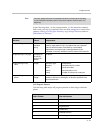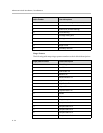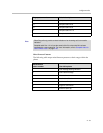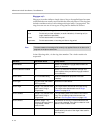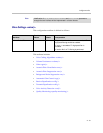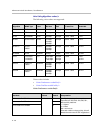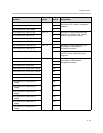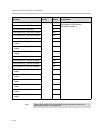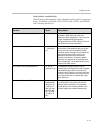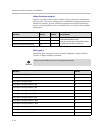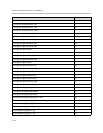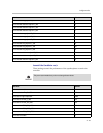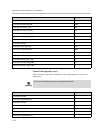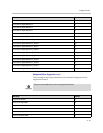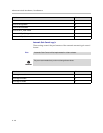
Configuration Files
A - 41
Codec Profiles <audioProfile/>
The following profile attributes can be adjusted for each of the five supported
codecs. In the table, x=G711Mu, G711A, G722, G7221, G7221C, and G729AB,
Lin16, Siren14, and Siren22.
Attribute
Permitted
Values Interpretation
voice.audioProfile.x.payloadSize 10, 20, 30, ...80 Preferred Tx payload size in milliseconds to be
provided in SDP offers and used in the
absence of ptime negotiations. This is also the
range of supported Rx payload sizes.
The payload size for G7221, G7221C, Siren14,
and Siren22 are further subdivided.
voice.audioProfile.x.jitterBufferMin 20, 40, 50, 60,
... (multiple of
10)
The smallest jitter buffer depth (in milliseconds)
that must be achieved before play out begins
for the first time. Once this depth has been
achieved initially, the depth may fall below this
point and play out will still continue. This
parameter should be set to the smallest
possible value which is at least two packet
payloads, and larger than the expected short
term average jitter. The IP4000 values are the
same as the IP30x values.
voice.audioProfile.x.jitterBufferShrink 10, 20, 30, ...
(multiple of 10)
The absolute minimum duration time (in
milliseconds) of RTP packet Rx with no packet
loss between jitter buffer size shrinks. Use
smaller values (1000 ms) to minimize the delay
on known good networks. Use larger values to
minimize packet loss on networks with large
jitter (3000 ms).
voice.audioProfile.x.jitterBufferMax >
jitterBufferMin,
multiple of 10,
<=300 for IP
320, 330, 430,
501,550, 600,
601, and 650
<= 200 for IP
301
The largest jitter buffer depth to be supported
(in milliseconds). Jitter above this size will
always cause lost packets. This parameter
should be set to the smallest possible value
that will support the expected network jitter.



